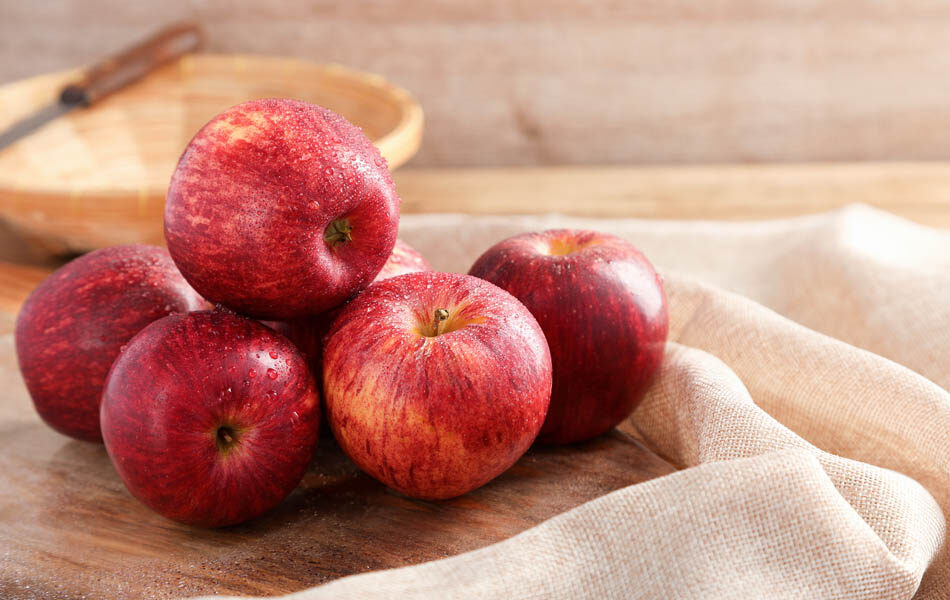Is Apple Good for Diabetes? 4 Amazing Benefits of This Fruit
Sweet fruits like apples are great for your long-term health. Some people might wonder if eating them can reduce diabetes-related symptoms. For those who are curious, we explain whether apples are good for managing diabetes and provide the 4 health benefits.

Apples contain lots of vitamins and minerals that support diabetes.
Getting essential nutrients in meals ensures your blood sugar doesn’t rise. A serving of apple may offer fiber, calcium, and potassium. People with diabetes need these minerals to maintain glucose production and prevent the long-term health risks of high blood sugar levels.
Eating fruit, in general, is really good for your body. Apples are very popular for satisfying sugar cravings, so it might be worth trying this food in a balanced diet. Of course, you might be wondering – is apple really good for type 2 diabetes, and how much can I have?
In this article, you’ll discover if apples are good for diabetes management.
Is Apple Good for Diabetes?
Yes, apples are great for diabetes, as they contain very important nutrients. The dietary fiber slows down the absorption of sugars after big meals. This can prevent blood sugar spikes in people with diabetes, making apples a perfect addition to your diet.
Getting lots of fiber in your diet may keep blood sugar levels stable and reduce insulin resistance. Your body can regulate insulin better once it digests natural sugars properly. Since this nutrient strengthens bowel health, you might also experience less severe constipation.
Apple has certain vitamins that help with diabetes. Vitamin C can maintain blood glucose levels throughout the day and after meal consumption. People who have at least 500mg of vitamin C a day have decreased lipids (a type of fat) in their bodies, preventing future weight gain.
Just be aware that apples contain a high amount of sugar and carbs. Too much of this fruit might cause blood pressure spikes in those with hypertension. If you regularly count your carbs while managing diabetes, make sure to account for apples and their nutritional profile.
How Does Apple Affect Blood Sugar?
Apples have a low glycemic index, meaning they won’t cause a blood sugar spike. This can depend on what type of apple you eat and whether you cook it. Tart green apples usually contain fewer natural sugars, making them a great choice for your diabetes diet.
One medium apple has lots of dietary fiber that helps improve insulin sensitivity. Your pancreas can regulate insulin levels without producing too much glucose in the bloodstream. In turn, this prevents heart disease due to the lower blood sugar when eating fiber-rich fruits.
Some people might choose to drink apple juice for diabetes management. However, apple juice contains too many added sugars and saturated fats that will raise blood sugar levels. The only benefit of drinking this fruit juice is the possible relief of chronic constipation symptoms.
Instead, aim to eat whole fruit like apples to improve your overall health. One medium-sized apple contains phosphorus – a mineral that may reduce glucose and insulin levels. Lower blood glucose means you’ll experience a reduction in blood pressure and LDL cholesterol.
Nutritional Value of Apples
It’s a common fact that apples are very nutritious and should be a part of your balanced diet. They hold important minerals for maintaining long-term health. People with type 2 diabetes should evaluate the nutritional worth of each food, including apples and their carb content.
Below, you’ll find the nutritional value of apples per 100g:

Glycemic Index of Apple
The glycemic index of 100g of apples is 28–44, depending on the type of apple you consume. For example, red apples have a higher GI due to the increased amount of sugars. If you want to reduce diabetes-related symptoms, aim to eat green apples with a low glycemic load.
You should always eat fruit that has a GI below 55. Anything above that can spike your blood sugar levels and cause those unwanted physical symptoms. If you cook an apple or mix it with other sugar-rich fruits, the overall glycemic load might be higher and more dangerous.
Another important thing to note is that canned fruit is also bad for your health. This is because they have lots of processed sugars, which increase the risk of heart disease. Eat fresh fruit, like organic green Granny Smith apples, from the market and add them to other fiber-rich meals.
Should People With Diabetes Eat Apples?
Yes, people with diabetes should eat apples to improve their long-term health. Eating apples will increase your fruit intake and fuel the body with essential minerals. If you don’t consume enough fresh fruits, your body can’t strengthen organ functions.
Of course, apples can support diabetes, but they also support weight loss. If you want to lose weight while still maintaining blood sugar levels, eating apples is one way to boost progress. You could eat other citrus fruits like lemon, limes, and oranges for weight loss results.
The more fruit you eat, the more likely you’ll have fewer diabetes symptoms. This might be headaches, tiredness, poor concentration, and blurred vision. Of course, moderation is key.
How to Eat Apples for Diabetes?
You can eat one medium-sized apple a day to manage diabetes. It’s recommended that people have green apples, as they don’t contain refined and processed sugars. If you want to eat more, monitor the number of carbs you’re eating to avoid hyperglycemia.
The common saying “eat your five a day” is especially important. You can increase your fruit intake by having one apple and eating fruits that contain minerals. Apples score low on the GI scale, so you don’t have to worry about consuming them on your diabetes-friendly diet.
Some people might even cut apples into slices and pair them with other healthy foods. For example, you could add apples to plain Greek yogurt, sugar-free granola, dark chocolate treats, low-carb baked desserts, or even your average green smoothie for weight management.
4 Benefits of Apples for Diabetes
Eating apples offers many benefits for your long-term health. You can enjoy them for their sweet taste while still maintaining blood sugar levels. If you’re not a big fan of green apples, simply add them to fruit smoothies or eat very small amounts of red apples to stay healthy.
Let’s take a look at the 4 health benefits of eating apples:
#1 Helps to digest better
Apples are a rich source of pectin – a type of soluble fiber that helps break down friendly bacteria in your digestive tract. This may relieve constipation and stop you from experiencing headaches or back pain, two common symptoms related to difficult bowel movements.
Consuming apples may also lower blood sugar due to the slow absorption of sugars after meals. A gel forms once the fiber is in your stomach, which also keeps you full for longer. You may not feel tempted to binge eat or reach for a fruit juice that could harm your health.
#2 Helps control diabetes
Of course, apples can lower blood sugar levels in those with diabetes. This may decrease the risk of cardiovascular diseases like coronary artery disease, high blood pressure, and congestive heart failure. Just make sure to choose green apples instead of saturated fruit juices.
#3 Might treat anemia
There is lots of iron in the skin of green apples, making them perfect for treating anemia symptoms. Consuming iron-rich fruits can increase hemoglobin – an important part of red blood cells that carry oxygen around the body while removing harmful toxins in the process.
Iron might also reduce insulin resistance in type 2 diabetes. This mineral stops the pancreas from producing too much glucose and releasing it into your bloodstream. Better insulin sensitivity means you won’t experience hyperglycemia symptoms like chest pain.
#4 Fights inflammation
Apples can lower C-reactive protein (CRP) – an inflammatory marker that causes chronic inflammation. Those with diabetes usually have more swelling in their bodies, so it’s important to eat more apples. Even eating them as a snack may reduce the risk of inflammatory diseases.
FAQs
Granny Smith apples are usually the best apples for diabetes. You can eat plenty of green apples to meet the daily fruit dietary guidelines. Just be aware that red apples have a higher sugar content, meaning they might contribute to insulin resistance and high blood sugar.
No, green apples can’t raise your blood sugar unless you have too many. This fruit is perfectly fine to have on a diabetes diet. You should always monitor your total carbohydrate intake, as this can prevent you from eating too many carbs and experiencing hyperglycemia symptoms.
Yes, you can eat apples every day while still maintaining good glycemic control. The nutrients in apples may prevent chronic disease compared to processed fruit in cans. Remember that low-GI foods are the best for your long-term health, as they can’t raise blood sugar levels.
A Word From Our MD
By now, you’ll know that apples are great for diabetes management. They contain plant compounds that lower the risk of cancer and strokes as well as boost your overall health. You can also eat other fruits, like lemons, oranges, mangos, bananas, and blueberries for diabetes.
People don’t need to focus only on eating fruit when reducing their blood sugar. Leafy green vegetables are especially great for your health, including kale, spinach, and lettuce. If you want to also lose weight safely, try the ketogenic diet that involves eating low-carb meals.
Focusing on food alone might not help everyone with diabetes. You should consult with your doctor about managing symptoms and finding the right diet plan.
Conclusion
So, are apples really good for diabetes?
Apples contain lots of vitamins and minerals that lower blood sugar levels. Eating fruit can fuel your body and decrease the risk of cardiovascular diseases. If you want to snack on apples every day, opt for Granny Smith green apples, as they have more dietary fiber and iron.

















































 Select your language:
Select your language: 








